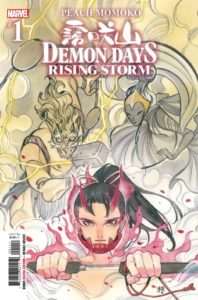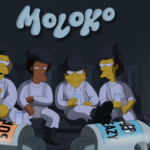
 The penultimate chapter of Peach Momoko’s Yoshida Saga arrives in this week’s Demon Days: Rising Storm #1, and Mariko is in for one bloody family reunion.
The penultimate chapter of Peach Momoko’s Yoshida Saga arrives in this week’s Demon Days: Rising Storm #1, and Mariko is in for one bloody family reunion.
Demon Days is writer/artist Peach Momoko’s unique take on the Marvel Universe, changing the setting to feudal Japan and implementing elements of Japanese folklore throughout. Our protagonist is an alternate version of Mariko Yoshida, the daughter of a powerful crime lord and one of Wolverine’s greatest loves. Here, she’s presented as an oni who is thrust into an adventure to learn more about her origins and who she really is versus who she wants to be. In Rising Storm, her travels have her collide with this universe’s versions of Storm and Thor, which goes about as smoothly as you might expect.
While I take umbrage with Marvel’s editorial decision to publish Demon Days as individual #1s rather than a straight series, I can actually see a sort of logic to it here. Perhaps the biggest strength of the series up to now is that each chapter can be read as standalone tales without needing to see the broader whole. It’s very much akin to the legends and folklore of Japan that Momoko is evoking in her treatment, where you’ll often hear fragments of a longer story or just one “episode” of a figure’s long life. (That being said, the issue does include a helpful recap page, as Marvel titles often do.) If you haven’t been keeping up with Demon Days, then Rising Storm succeeds as “that one time Mariko fought Thor and Storm” and nothing more. This issue definitely ends on a cliffhanger that readers may or may not follow to the final issue, but the overall package will leave them feeling like they got their money’s worth regardless.
As for Demon Days’ relationship to the Marvel Universe, there are plenty of references and allusions to the mainstream versions of these characters, which should please any Marvel fan even if they’re not overly familiar with the trappings of Japanese folklore. I enjoyed seeing Storm and Thor through Momoko’s lens, and I think her depiction of onis as being somewhat parallel to that of mutants in this reality—feared and villainized regardless of their nature—is clever. Mariko’s 616 counterpart has only ever been presented as non-mutant, so she’s an unexpected but appreciated lead in this saga that helps it feel more singular than it already would have otherwise. The fact that her trusty wolf companion is Momoko’s version of Wolverine is also very funny. Similarly to Momoko’s spritely script (translated to English by Zack Davisson), Demon Days really shines through its lush, beautiful art that at least appears to be done in watercolor, which amplifies the book’s inherent folky nature. In an industry defined by sameness and a lack of deviation from an established formula, Demon Days really stands out as a unique take worth checking out.


![[REVIEW] THAT TEXAS BLOOD #1: THE CASSEROLE DISH](https://geekd-out.com/wp-content/uploads/2020/06/Screen-Shot-2020-08-04-at-12.53.02-PM-150x150.png)

